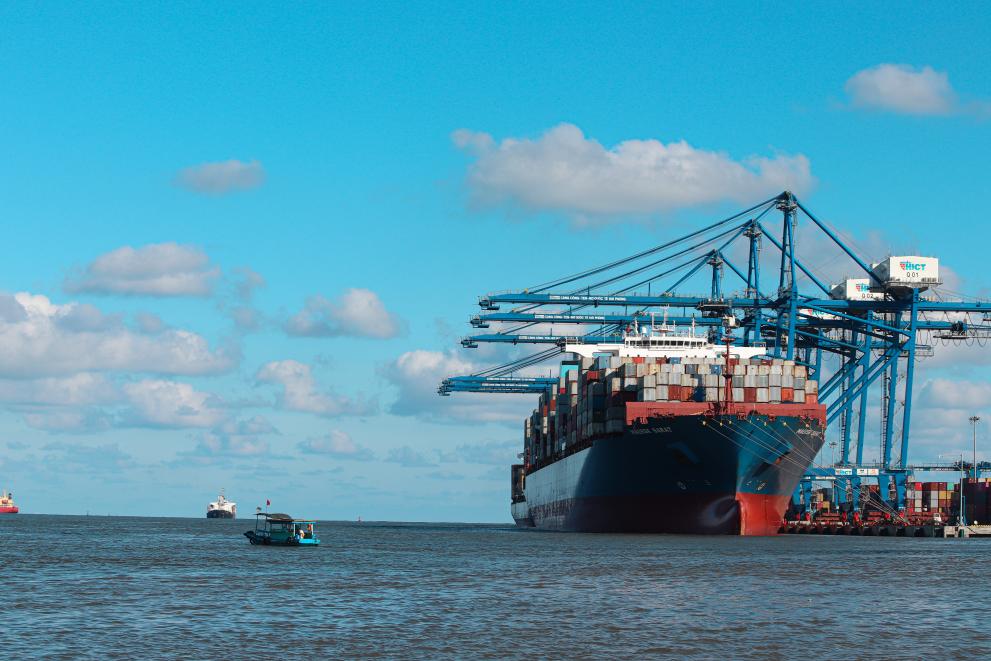
The Commission welcomes the political agreement reached between the European Parliament and the Council that increases the maritime transport sector's contribution to reaching the EU-wide target of reducing net greenhouse gas emissions by at least 55% by 2030, and to achieving climate neutrality in 2050.
Early this morning co-legislators agreed on FuelEU Maritime – a new EU regulation ensuring that the greenhouse gas intensity of fuels used by the shipping sector will gradually decrease over time, by 2% in 2025 to as much as 80% by 2050. This measure will help reduce greenhouse gas emissions from the shipping sector by promoting the use of cleaner fuels and energy.
The deal complements the provisional agreement reached on 18 December 2022 to include shipping emissions in the EU Emissions Trading System (EU ETS), both key initiatives in the EU's efforts to reduce maritime emissions.
Decarbonising maritime transport
In the EU, waterborne transport generated 3 to 4% of total CO2 emissions in 2021. Despite a drop in activity in 2020 due to the coronavirus pandemic, shipping is expected to grow, fuelled by rising demand for primary resources and container transport.
FuelEU Maritime will help decarbonise the maritime transport sector by setting maximum limits on the yearly greenhouse gas intensity of the energy used by a ship. Those targets will become more ambitious over time to stimulate and reflect the expected developments in technology and the increased production of renewable and low-carbon fuels. The targets cover not only CO2, but also methane and nitrous oxide emissions over the full lifecycle of the fuels.
The new rules also introduce an additional zero-emission requirement at berth, mandating the use of on-shore power supply (OPS) or alternative zero-emission technologies in ports by passenger ships and containerships, with a view to mitigating air pollution emissions in ports, which are often close to densely populated areas.
FuelEU Maritime takes a goal-based and technology-neutral approach, allowing for innovation and the development of new fuel technologies to meet future needs, and offering operators the freedom to decide which to use based on ship-specific or operation-specific profiles. The Regulation also provides for a voluntary pooling mechanism. Under this scheme, ships will be allowed to pool their compliance balance with one or more other ships. Thus, it will be the pool as a whole that has to meet the greenhouse gas intensity limits on average.
The harmonised EU mandate will maintain a level playing field and ensure that the market for sustainable maritime fuels will grow and that maritime transport continues to function well while contributing to the EU's climate goals. It will do this by increasing demand for renewable and low-carbon fuels. It will provide legal certainty for ship operators and fuel producers and help kick-start the large-scale production of sustainable maritime fuels. In turn, this will help reduce the price differential between fossil fuels and sustainable options. A special incentive regime has been included to support the uptake of renewable fuels of non-biological origin with a high decarbonisation potential.
Next steps
The political agreement reached this morning must now be formally adopted. Once this process is completed by the European Parliament and the Council, the new rules will be published in the Official Journal of the European Union and enter into force 20 days after publication.
Background
The European Green Deal is the EU's long-term growth strategy to make Europe climate-neutral by 2050. To reach this target, Europe must reduce its emissions by at least 55% by 2030, compared to 1990 levels. This morning's agreement is another important step in the adoption of the Commission's 'Fit for 55' legislative package to deliver on the European Green Deal. It follows other political agreements on parts of this package, most recently on stronger rules to boost energy efficiency.
By contributing to around 75% of EU external trade volumes and 31% of EU internal trade volumes, maritime transport is an essential component of Europe's transport system and plays a critical role for the European economy. Currently, the fuel mix in the maritime sector relies entirely on fossil fuels. To achieve climate neutrality, the EU needs to reduce transport emissions, including from maritime transport, by 90% by 2050 (compared to 1990 levels). The increased use of renewable and low-carbon fuels through FuelEU Maritime and larger support for innovation to address the environmental impact of the shipping sector will be crucial for the EU reaching its climate objectives under the Paris Agreement, and making the European Green Deal a reality.
For More Information
Provisional agreement to extend the EU ETS to emissions from the maritime sector
Reducing emissions from the shipping sector
Quote(s)
Ships must and will shift away from fossil fuels and towards greener alternatives. With the long-term outlook of this agreement, we are sending a clear signal to the sector across the value chain, from shipowners and operators to fuel producers, shipyards and equipment manufacturers, that it is worthwhile and necessary to invest in sustainable maritime fuels and zero-emission technologies. This is fully in line with our efforts to support sustainable alternative fuels technologies under the new Net Zero Industry Act.
Adina Vălean, Commissioner for Transport - 23/03/2023
The EU is fully committed to its 2030 and 2050 climate targets, and we are determined to set all sectors on a pathway to climate neutrality. With this agreement as a complement to the previous one on including maritime emissions into the EU ETS, we are building a comprehensive framework to reduce greenhouse gas emissions from shipping. It is an important part of the ‘Fit for 55’ equation.
Frans Timmermans, Executive Vice-President for the European Green Deal - 23/03/2023
Details
- Publication date
- 23 March 2023
- Author
- Representation in Cyprus
